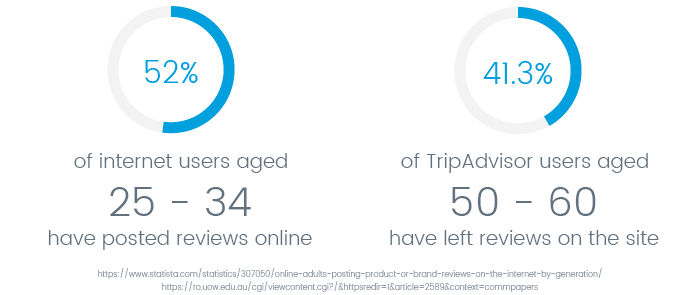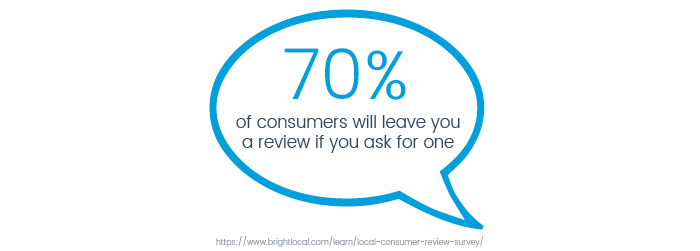With the growth of online spaces populated by user-generated content, word of mouth is increasingly becoming digitised, and reviews that are shared with online communities often even overshadow the recommendations that are passed on in person.

But while it’s easy to understand your guests voicing their opinions to friends and family, understanding why guests choose to post reviews online for the world to see isn’t quite as simple. Why do individuals involve themselves in the decision making processes of others, for example? Are reviewers posting to help their communities, or for their own gain?
Why is it important to know what inspires guests to leave reviews?
In the hospitality industry, it’s vital to know as much about your guests as you can, whether you use this knowledge to provide a personalised experience at your property, to help you market to potential future guests, or simply to enhance your guest experience in general. But understanding why guests leave reviews is valuable in other ways as well.
By garnering insights into your guests’ frame of mind when they are leaving reviews, you can ensure that they are in the right frame of mind when they leave your property, encouraging them to review you. Better still, if you can understand why it is that guests leave negative reviews, you have an opportunity to sense a negative review before it comes. This way you can either resolve it in a positive way to ensure that the guest doesn’t leave dissatisfied, or provide alternative methods for that guest to voice their displeasure that don’t wind up on the world wide web.
Who can you expect to see reviews from?
One place to start when determining what might be motivating your guests to leave reviews is to figure out which of your guests would be most likely to leave them. You may feel, for example, that as a property that caters to luxury clientele, your guests are less likely to revert to online methods to sing your praises or point out small grievances, or that since your guests are older, they won’t be leaving you online reviews. But you may be surprised.

There is a misconception that it’s only the younger generations that leave reviews online, possibly because they are associated with the internet revolution. But, while Statista confirms that 52% of internet users aged 25-34 have posted reviews online, research by Kyung Hyan Yoo and Ulrike Gretzel of Texas A&M University found that, of over 1000 TripAdvisor users, 41.3% of those who contributed reviews were between 50 and 64 years of age, making up the largest demographic of the study. This goes to show that it is hardly only millennials and younger generations that are sharing their thoughts of stays online. Younger generations may have been more savvy than their elders at the outset, but writing an online review is not a technical challenge, and with the advances of smart phones, connectivity and apps, it’s not just youngsters who are using the internet to book, and review, their travels.
According to research by Kyung Hyan Yoo and Ulrike Gretzel, Texas A&M University, of over 1000 TripAdvisor users, 41.3% of those who contributed reviews were between 50 and 64 years of age.
When it comes to negative reviews in particular, Our Social Times point out that most online complaints actually come from older men, rather than millennials and, as Zendesk noted in a 2013 report, it may be that properties catering to higher income guests are actually at slightly more of a risk of being scrutinised online. Their research, which looked at consumers in general, rather than focussing on the hospitality industry alone, found that customers who had a household income of over $150,000 had the longest memory when it came to bad customer service experiences, and “among [participants] earning more than $150,000 a year, a remarkable 100% had shared their bad customer experiences with others.” While this is not directed at the hospitality industry specifically, it shows that those who are prepared to spend a larger sum on an experience are also those who will be least magnanimous should that experience not meet their expectations.
Why do your guests write online reviews?
Now that we’ve looked at which guests are likely to be writing reviews, it’s time to look at what motivates them.
Many companies are under the impression that most people write reviews because they want something for themselves. As Rebecca Haden of Haden Interactive points out, the majority of surveys that she has come across, when asking users why they write reviews, list four options:
- To be helpful for others who would later consider investing in a product or experience
- For prestige, such as being a top reviewer or recognised source on a platform
- As content for their own audience on a blog or social media platform
- For goodies, discounts or other benefits from the company
Out of these four options, only one of them is altruistic, with the other three being self-serving. However, as Rebecca also notes, these four options don’t really reflect the broader emotional motivations for leaving reviews that many users experience. And Maarten Rensink agrees. In his 2013 study, he looked at 7 motivating factors that resulted in people leaving reviews, being:
- Venting
- Helping others
- Warning others
- Self enhancement
- Social benefit
- Helping the company
- Seeking advice
These can be broken down into motivations that inspire positive reviews and motivations that inspire negative ones — wanting to help others and help the company will often result in positive reviews, while wanting to vent or warn others will almost always result in negative reviews. They can also be broken down into motivations that are self-serving, and those which are altruistic in nature — venting, self enhancement and social benefit are all self-serving motivations, as they have the reviewer’s wellbeing or standing in a community as their focus; while helping others, warning others, and helping the company are all focused on benefiting others that aren’t the reviewer themselves.

This provides a far more rounded look at what may inspire guests to leave reviews, and particularly goes to show that they are often written not for the benefit of the guests themselves, but for the benefit of both their communities, and the properties themselves — so that they can improve upon minor inconveniences, and so that they can help others who are trying to make informed decisions about their next stay.
What this research does not show, however, is one of the most powerful motivators for guests to leave reviews — being asked. As BrightLocal found in their latest annual Local Consumer Review Survey, “70% of consumers that have been asked to leave reviews went on to do so.”
Another factor to be considered when looking at the motivation behind reviews is that the vast majority of those who write them have had either an exceptionally positive, or an exceptionally negative experience. As Trustpilot explain:
"Our research shows that consumers are more inclined to write reviews when the experience they’ve had strikes an emotional chord, whether positive or negative. If a consumer has had a very poor experience, they’ll write a review in order to vent frustration and anger, especially if they feel personally mistreated or wronged. In the same manner, if a consumer has had an exceptionally good experience, they’re likely to applaud the company with a good review to help the company succeed." — TrustPilot
Trustpilot are hardly the only company to have realised this correlation. In a study done by Cornell University, it was found that most reviews on TripAdvisor are either overwhelmingly positive, or overwhelmingly negative, with few guests venturing to write reviews when their stay was simply pleasant or satisfactory.
However, the same Cornell University study, which examined 1.28 million reviews on TripAdvisor found that the vast majority of reviews, more than 70%, were positive, with ratings of 4 or 5, while only 15% had ratings of 1 or 2. This goes to show that while it is extraordinary experiences, both positive and negative, that generally result in reviews, positive experiences are far more likely to be shared online.
What does this mean for you?
You know which of your guests might be leaving you reviews, and can understand the motivations behind them, so what is the next step? What can you do to ensure that guests are both more motivated to write you reviews, and at the same time don’t feel the need to post negative reviews online?
The first step is to make sure that it’s easy for your guests to give you feedback, both during their stays and after they leave. During stays, the human touch can work wonders in helping your guests to feel comfortable, and if your friendly staff ask for feedback, guests will often be happy to provide it in person. But, at the same time, many guests feel uncomfortable giving feedback directly, particularly if there are small inconveniences that they experienced, or they are worried that they might cause offence.
“70% of consumers that have been asked to leave reviews went on to do so.” — BrightLocal
In these cases, providing guests with an opportunity to give their feedback in a digital, non-confrontational manner, with a feedback survey for example, will often make them feel that their views are valued, and their concerns heard. If they’d planned to leave a less-than-glowing online review, it can make them less likely to mention those inconveniences on a public forum, having already had the opportunity to address it with management directly. If they’d planned to leave a positive review, it can serve as a reminder of their favourites parts of their stay. And when guests do post reviews online, you can make it easy for them to do so by having presences across social media and OTA platforms, ensuring that you get all the feedback you need.
This being said, you want to make getting feedback easy for yourself as well, and there can be no denying that capturing the feedback that guests give your staff in person is no easy task, or that checking every social media and review platform can easily become a full-time job. This is where a company like GuestRevu comes in, by helping you to ask for, and collate, direct guest feedback, while also helping you to manage your online reputation to save you time and keep track of reviews across your platforms.
With a single, consolidated dashboard that shows you the latest reviews for your property from online guest surveys as well as TripAdvisor, Google Reviews, Booking.com, Expedia, Facebook, and so many other platforms, you can keep up to date with all of your reviews in one place. Better still, be notified as soon as reviews come in, or choose to get a daily, weekly or monthly summary of your latest reviews straight to your inbox.
But even making it easy for guests to leave their reviews online isn’t always enough — remember that guests tend to only leave reviews for exceptional stays, after all. This is why the art of asking is so important. Remember, as BrightLocal pointed out, 70% of consumers will leave you a review if you ask for one, and those guests who are satisfied with their stays, even if they’re not overwhelmingly thrilled with them, are often happy to leave a review when asked.
GuestRevu makes asking for reviews a cinch. You can send customisable guest surveys in various languages, and covering different areas of your property thanks to multiple questionnaires, after your guests have left, or even before they’ve arrived. GuestRevu also integrates with a number of property management systems, automating the process so that your surveys go out after guests check out without you needing to lift a finger.
And finally, it has never been more important to be responding to online reviews. As Our Social Times notes, 70% of users who write negative reviews are looking for a response, but only 38% of them get one. By writing a great response to a negative review, you are turning a public proclamation of dissatisfaction into a conversation, and are showing both the guest who left the review, and anyone else who may come across it in future, that you care about customer service, and that you take comments to heart. It may not change the guest’s mind about the experience that they had (though stranger things have happened), but it may convince a reader that your property is the one that they want to book. Plus, as Rebecca Haden explains, “consumers are less likely to desire vengeance if they feel that you have listened to them and done what you can to make things right.”
As GuestRevu pulls online reviews from multiple platforms into a single dashboard, it simplifies the process of responding to reviews as well, since you’re able to navigate to particular reviews with the click of a button, straight from your dashboard.
Online reviews have never been more important to hospitality businesses, and convincing guests to leave the quantity and quality of reviews that you want is no easy feat. But, by understanding who is leaving reviews and why, and with the help of direct guest feedback and reputation management tools like GuestRevu, you can certainly encourage your guests and leave them feeling motivated to share their experiences online.




